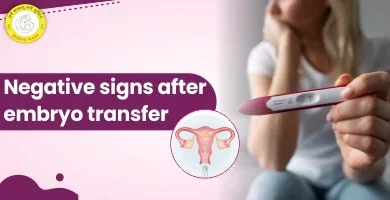Best Age to Get Pregnant with PCOS: Key Tips for Success

PCOS i.e. Polycystic Ovary Syndrome is a common hormonal disorder which affects the fertility of women. If you have PCOS, you may be wondering, “What is the Best Age to Get Pregnant with PCOS?” This question is critical because conceiving in PCOS may be difficult, but not impossible.
Today, with the right planning and treatment, the dream of a healthy pregnancy can be fulfilled even with PCOS. In this blog, we will understand the connection between PCOS and fertility and identify the best age at which the chances of pregnancy are higher. As the saying goes, “Where there is a will, there’s a way.” Let’s have a discussion!!
What is PCOS and How Does It Affect Fertility?
In this Article
PCOS, Polycystic Ovary Syndrom, is an condition which results from hormonal imbalance and affects the normal functioning of the ovaries. This leads to quick fluctuations in the cycle, more androgen production, and small ovarian cysts filled with clear fluid. Even though PCOS is not solely a disorder of infertility, it is the most common cause of ovulation disorders. (Also Read: Complete Guide to PCOS and How it Affects Your Pregnancy)
Here’s How PCOS affects fertility
1. Irregular Ovulation: In the case of women with PCOS, the menstrual cycle is irregular; hence ovulation is sometimes not present or very frequent. Also, when ovulation is not consistent, trying to get pregnant through natural conception is quite challenging.
2. Egg Quality: Flaws in hormonal balance lower the quality of eggs and once again decrease the prospect of fertilization.
3. Other Factors: Factors such as insulin resistance, obesity and high levels of LH actually worsen fertility. However, it is clear that modern medicine and lifestyle changes may enhance the prospective fertility of women with PCOS.
Understanding Fertility and Age with PCOS
| Age Range | Fertility Overview | Impact of PCOS | Key Takeaway |
| 20s to Early 30s | Fertility is at its peak. Egg quality and ovarian reserve are strong. | Women with PCOS respond well to treatments, increasing chances of successful conception. | Ideal window for conception; proactive steps can maximize success. |
| Mid-30s to Late 30s | Fertility begins to decline. Egg quality and quantity reduce. Risk of complications increases. | PCOS-related issues such as poor egg quality, insulin resistance, and miscarriage risks become more prominent. | Early medical intervention can help manage risks and improve outcomes. |
| 40 and Beyond | Fertility is significantly reduced. Natural conception chances are minimal. | PCOS adds to age-related declines, and fertility treatments like IVF have lower success rates. | Conception is still possible but requires advanced medical assistance and careful planning. |
Advantages of Early Pregnancy for PCOS
| Advantage | Explanation | Why It Benefits Women with PCOS |
| Better Egg Quality and Ovarian Reserve | Younger women have healthier eggs with fewer chromosomal abnormalities. Ovarian reserve is also stronger. | PCOS often impacts egg quality, but younger women have a better chance of conceiving with fewer complications. |
| Higher Response to Fertility Treatments | Fertility treatments like ovulation-inducing medications and IVF are more effective in younger women. | Women with PCOS respond better to these treatments when attempted earlier in life. |
| Reduced Risk of Pregnancy Complications | Gestational diabetes, hypertension, and preeclampsia risks are lower in younger pregnancies. | PCOS increases these risks, but early pregnancy minimizes their likelihood due to better metabolic and hormonal health. |
| Easier Physical and Emotional Recovery | Younger bodies recover faster from pregnancy and childbirth; emotional resilience is higher. | PCOS-related stress and hormonal fluctuations are easier to manage during early pregnancy and post-partum recovery. |
Best Age to Get Pregnant with PCOS
If you are searching for the best age to conceive with PCOS, the answer is between 25 to 30 years. This age is medically the best age to get pregnant as the body has an optimal balance between fertility as well as the maturity to manage health along with the baby.
It is not that you cannot become a mom after that, but conceiving earlier gives you many advantages including healthier eggs and a more responsive body. Beyond 30, the likelihood of complications such as miscarriage and infertility increase. However, there are many advancements in fertility treatments. These advancements ensure that even women in their late 30s or early 40s with PCOS can achieve successful pregnancies.
Key Tips for Successfully Getting Pregnant with PCOS
1. Follow a Healthy Diet: You must have low-glycemic foods. Whole grains, vegetables, and lean protein would help you manage insulin resistance and support ovulation.
2. Maintain a Healthy Weight: Consider losing 5-10% of your body weight. This would improve hormonal balance and ovulation. This would be very good for your overall health.
3. Track Ovulation: You can use ovulation kits, temperature charts, or apps to find your fertile window and time to intercourse effectively.
4. Exercise Regularly: Do moderate activities like yoga, walking, or swimming to regulate hormones and improve reproductive health. Avoid over-exercising.
5. Manage Stress Levels: Try meditation, mindfulness, or deep breathing to lower cortisol and balance hormones.
6. Limit Caffeine and Avoid Alcohol: Reduce caffeine and stop alcohol to support healthy hormone regulation.
7. Consult a Fertility Specialist: This step is the most crucial one. Seeking help after 6-12 months of trying or if symptoms are severe is very important. Your specialists can provide treatments that would help you for betterment.
8. Consider Supplements: Always take doctor-approved supplements like folic acid, Vitamin D, or inositol to regulate cycles and improve your chances of fertility.
Treatment for PCOS to get Pregnant
- Lifestyle Changes:
- You should be focusing on weight loss, a balanced diet, and regular exercise.
- This lifestyle change can help you reduce insulin resistance, enhance ovulation, and boost reproductive health.
- Ovulation-Inducing Medications:
- You must include drugs like Clomiphene Citrate, Letrozole, or injectable gonadotropins. You might feel like these are not going to help but trust your healthcare specialist and obey them for medication.
- These medicines would stimulate ovulation in women with irregular or absent cycles.
- Insulin-Sensitizing Drugs:
- You need to know that medications like Metformin improve insulin response. However, it is important to take advice from your doctor.
- This is something that regulates cycles, supports ovulation, and reduces PCOS symptoms.
- Hormonal Birth Control:
- Used temporarily to balance hormones and regulate periods.
- Discontinuing may lead to more predictable ovulation.
- Ovarian Drilling Surgery:
- Your healthcare professional may advise you for a laparoscopic procedure for creating small holes in the ovary.
- This is to restore ovulation in women unresponsive to medications.
- In Vitro Fertilization (IVF):
- In this process, fertilisation occurs outside the body, with implantation into the uterus.
- This is very effective for severe PCOS or when other treatments fail.
- Supplements and Vitamins:
- Includes inositol, folic acid, Vitamin D, and Omega-3.
- Improves egg quality, hormone regulation, and fertility.
- Acupuncture and Herbal Remedies:
- Alternative therapies to improve blood flow to ovaries and reduce stress.
- Complement traditional treatments for stress-related ovulation issues.
When to Consult a Fertility Specialist
If you have PCOS and are facing challenges in conceiving, it’s important to know when to seek help from a fertility specialist. Here are some situations when consulting a specialist becomes necessary:
1. Unable to Conceive After 6-12 Months
This much time is enough to try and get pregnant. But if you’ve been actively trying to conceive for 6-12 months while tracking ovulation, and timing intercourse correctly, it’s time to see a specialist.
Why: It might be a medical issue, and a specialist can assess your ovulation cycle and egg quality and recommend a proper treatment plan.
2. Irregular or Absent Periods
We women suffer from menstruation cycle every month and it is normal for us. If your menstrual cycles are irregular or completely absent, this is not normal. It could be a sign of severe PCOS disrupting ovulation.
Solution: Your specialist can prescribe ovulation-inducing medications or hormonal therapies to improve your chances of conceiving.
3. If You’re 30 or Older
You should know why our elders always told us to have babies on the right time. Fertility naturally declines with age. If you’re 30+ and have severe PCOS, it’s crucial to take action quickly without delay. Sometimes obeying our elders is the best choice.
Fact: Consulting a specialist early can help reduce age-related risks and complications.
4. Experiencing Severe PCOS Symptoms
Well, every unusual thing has a reason. If you see any symptoms like excessive weight gain, facial hair growth, acne, and insulin resistance, it can make pregnancy more challenging.
Benefit: A specialist can help manage these symptoms and prepare your body for pregnancy.
5. History of Repeated Miscarriages
We know it’s heartbreaking but if you’ve been able to get pregnant but have had multiple miscarriages, it’s essential to see a fertility expert.
What They Do: Specialists run tests to identify issues like uterine problems or hormonal imbalances. It reduces the risk of future miscarriages.
6. When Advanced Treatments Are Needed
This age is all about science and technologies. If natural conception isn’t possible, a fertility specialist can guide you through options. There are many options like IVF (In Vitro Fertilization), IUI (Intrauterine Insemination), or egg freezing.
Note: IVF has a higher success rate for women with PCOS, especially if done earlier in life.
Challenges of Delayed Pregnancy with PCOS
| Challenge | Description | Impact on Women with PCOS |
| Reduced Fertility | Fertility naturally declines with age, affecting egg quality and ovarian reserve. | Women with PCOS may experience an earlier decline in egg quality, further reducing chances of conception. |
| Higher Risk of Pregnancy Complications | Complications such as gestational diabetes, hypertension, and preeclampsia become more common with age. | PCOS increases the likelihood of these complications, making pregnancy riskier at an older age. |
| Increased Risk of Miscarriage | The likelihood of chromosomal abnormalities in eggs increases, leading to higher miscarriage rates. | PCOS already raises the risk of miscarriage, compounding the challenges of delayed pregnancy. |
| Lower Success Rates with Fertility Treatments | Success rates for treatments like IVF decline with age as egg quality and uterine receptivity decrease. | PCOS symptoms, combined with age-related factors, reduce the effectiveness of assisted reproductive technologies. |
| Prolonged Time to Conceive | Older women often take longer to conceive naturally due to a decline in reproductive health. | PCOS-related irregular ovulation makes the process even more challenging. |
| Emotional and Physical Strain | Delayed pregnancy can increase stress and anxiety, along with the physical toll of treatments. | Women with PCOS often face added emotional and physical strain from managing symptoms and fertility challenges. |
| Age-Related Health Issues | Chronic conditions like obesity, diabetes, and cardiovascular problems become more common with age. | PCOS exacerbates these issues, further complicating pregnancy and overall health. |
Conclusion:
The best age to get pregnant with PCOS is in your 20s to early 30s when fertility is at its peak, and your body responds better to treatments. Delaying pregnancy can lead to complications, but with early planning, healthy lifestyle changes, and medical support, women with PCOS can achieve successful pregnancies. Talk to experts at the best IVF center in Patna for a personalized PCOS fertility plan.
FAQs
What is PCOS?
PCOS (Polycystic Ovary Syndrome) is a medical condition. In this condition a woman’s ovaries produce more male hormones, leading to irregular periods. It also causes difficulty in ovulating and other symptoms like weight gain and excess hair growth can be seen.
Can women with PCOS get pregnant?
Why not? Women with PCOS can get pregnant. But it may take a long time due to irregular ovulation. With proper treatment, many women with PCOS can conceive.
What is the best age to get pregnant with PCOS?
20s to early 30s. This is the age when egg quality and ovarian reserve are still good, and fertility treatments tend to be more successful.
How does PCOS affect fertility?
There are many ways but mostly PCOS affects fertility by causing irregular or absent ovulation, which makes it harder to get pregnant. Hormonal imbalances and insulin resistance also play a role.
Can weight loss help with pregnancy chances for women with PCOS?
Yes, losing even a small amount of weight can help regulate your menstrual cycle and improve your chances of conceiving.
When should I consult a fertility specialist if I have PCOS?
If you’ve been trying to conceive for 6-12 months without success, or if you have severe PCOS symptoms, it’s a good idea to consult a fertility specialist.
Are there treatments available to help women with PCOS get pregnant?
Yes, there are many treatments. You can get in touch with your healthcare expert and discuss the best available treatment.
Is pregnancy riskier for women with PCOS?
It could be risky for any woman who is not taking care of herself. Pregnancy can carry higher risks for women with PCOS, including gestational diabetes, hypertension, and miscarriage. If you have got proper medical care, it would help manage these risks.



